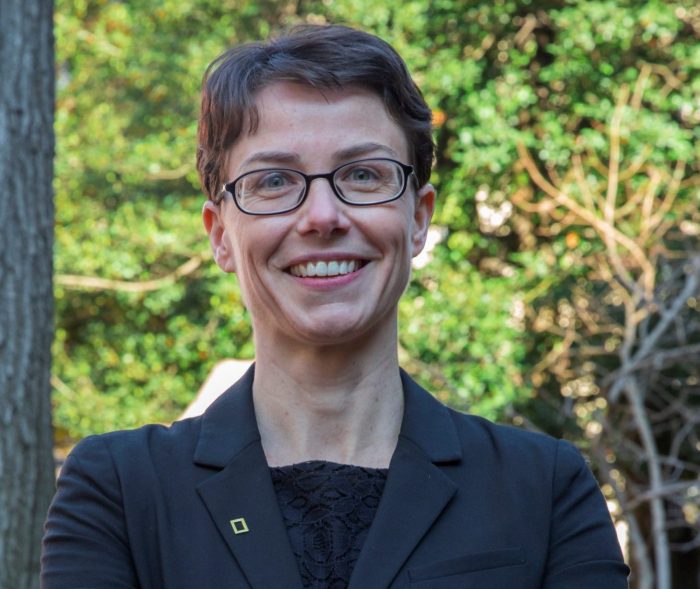SBU chooses Lynch as inaugural director of the Collaborative for the Earth

Heather Lynch is hoping to take a few pages out of the Coke and Pepsi playbook, which is rarely, if ever, used in the fields where she works.
A penguin expert who has traveled more than 9,000 miles to Antarctica to monitor populations of these flightless water foul, Lynch, who is the IACS Endowed Chair of Ecology & Evolution, plans to use her new role as the inaugural director of the Collaborative for the Earth at Stony Brook University to accomplish several tasks, including shaping the way people think about environmental issues like climate change.
“Coke and Pepsi understand the importance of psychological research and persuasion,” Lynch said. “The environmental community has not used any of the tools to get at the hearts and minds” of the public.
Scientists have been trying to reach people in their heads when they also need to “reach them in their hearts,” she added.
Lynch hopes to figure out ways to bring in people who are experts in psychology and persuasion instead of adding another model of climate change consistent with so many others that have made similar predictions.
Lynch, whom a steering committee chose from among several qualified tenured faculty at SBU to take on this new role, will also help organize forums in which researchers and participants worldwide discuss pressing environmental issues.
In the forums, Lynch plans to encourage debate about challenging topics on which researchers disagree, such as the role of nuclear power in achieving net-zero greenhouse gas emissions. She also hopes to address the concept and moral hazard of geoengineering.
In recent years, scientists have debated whether geoengineering, in which scientists use chemical means to cool the atmosphere, could exacerbate the problem or give people false hope that taking steps to reduce emissions or mitigate climate change may not be necessary.
Lynch also suggested other “third-rail topics” as population control may be fodder for future Stony Brook forums.
Scientists “don’t discuss controversial things,” said Lynch. “There tends to be an echo chamber in the scientific community. The forum will help us air these issues.”
To be sure, Lynch believes the issue of climate change and the urgency of the climate crisis is well established. The differences she hopes to discuss relate to various potential solutions.
“I’m hoping to focus on things where we disagree,” she said. “We need to get at the root of that.”

The right candidate
As a candidate, Lynch met numerous criteria for the search committee and for Provost Carl Lejuez, to whom Lynch is reporting in this role.
“Her research is and has been squarely placed to understand climate change and the climate crisis and how we try to move forward toward a healthier planet,” said Lejuez.
Lynch is also a “creative, entrepreneurial thinker” who has an “exciting vision for what the Collaborative can be,” Lejuez said. “She has a real strength in leadership and is very good at bringing people together.”
Lejuez has several goals for the Collaborative in its first year. He would like Lynch to start creating forums that can “live up to the potential of being a leader in creating that academic conference that brings rigor to real-world problems” and is connected to policy, industry and politics and that has clear deliverables.
Additionally, Lejuez would like the Collaborative to move toward an understanding of Stony Brook’s role in the future of climate science, climate justice and sustainability.
New podcasts
Lynch plans to dedicate considerable energy to this effort, cutting back on some of her teaching time. She plans to conduct podcasts with people on campus, speaking with them about their work, what keeps them up at night, what technologies excite them and a host of other topics.
She also hopes to bring in the “brightest lights” to big-stage events at Governors Island and on Long Island.
She is pondering the possibility of creating a competition akin to the entrepreneurial TV show “Shark Tank.” At Stony Brook University, faculty judges could evaluate ideas and advance some of them.
The Shark Tank could give students an opportunity to propose ways to create a greener Stony Brook campus.
As for the psychology and social science of environmental efforts, Lynch plans to work with the Alan Alda Center for Communicating Science to explore ways to understand how people think about these issues.
The evidence and impact of climate change increases the urgency of this work and the potential contribution of the university to debating, addressing and proposing solutions.
Earlier this year, Hurricane Otis intensified within 12 hours from a tropical storm to a deadly Category 5 hurricane, slamming into Mexico.
The potential for future storms with intensification that occurs so rapidly that forecasts might not provide warnings with sufficient time to take emergency measures should ring alarm bells for area residents.
Hurricane Otis, whose intensification was the second-fastest recorded in modern times, “should scare everybody on Long Island,” said Lynch. “People think toddling along with business as usual is an option. That is not an option.”






